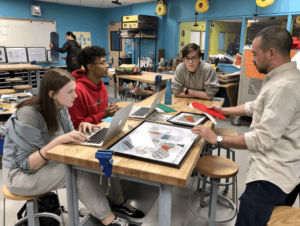Schools Avoid Going Deeper in Computer Science
This compelling account of how national K-12 schools are teaching computer science leaves little doubt that we are missing a slice of the big picture. The report says that most schools in the United States teach nothing beyond the basics of computer science.
Computer-related technology is increasingly driving the US economy, yet computer science education is scant in most American elementary and secondary school classrooms and the number of introductory and Advanced Placement courses in computer science has actually declined in the last five years, according to a report released this fall.”Some states and some schools are offering some really excellent courses,” said Mark Stehlik, co-author of the report, “Running on Empty: The Failure to Teach K-12 Computer Science in the Digital Age.” “But overall, the picture is pretty bleak,” added Stehlik, assistant dean for undergraduate education at Carnegie Mellon University’s School of Computer Science.
The report by the Association for Computing Machinery (ACM) and the Computer Science Teachers Association (CSTA) found that most schools focus on teaching students how to use a computer and run available applications, rather than also teaching deeper concepts, such as computational problem-solving, that lay the foundation for innovation. Fourteen states have adopted no standards at all for upper-level computer science education.
If you think that having to be able to demonstrate through your own work a mastery of a skill set or industry area, create your own web pages, and act as programmer and curator to the body of work that you will be asked to create throughout your life — which you will be storing on the Internet — I think we are really doing a disservice to children here.
It’s very clear in other parts of the world that communicating on the Internet, mashing up software and creating networks of peers and colleagues for peers and colleagues is becoming a skill just as primary to life as reading, writing and arithmetic. I’ve sat in on classes where students no older than seventeen were creating web pages and web programs that dealt with online auctions, showcasing design work, and creating a transparent open registry of their projects to share with not only their class, but the entire administration of a university.
And this was in the middle of Guangzhou province, in a University that sat out on a lake, where you had to fight through acres of bike traffic through a decaying urban center where people carted around chickens in wicker baskets.
Related articles
- Report finds K-12 computer science education declining (eurekalert.org)
- “Computer Science Education Week Spotlights the Needs in US Schools” and related posts (msdnrss.thecoderblogs.com)
- Celebrating the second Computer Science Education Week (googleblog.blogspot.com)








0 Comments
Leave a Comment
Your email address will not be published. All fields are required.